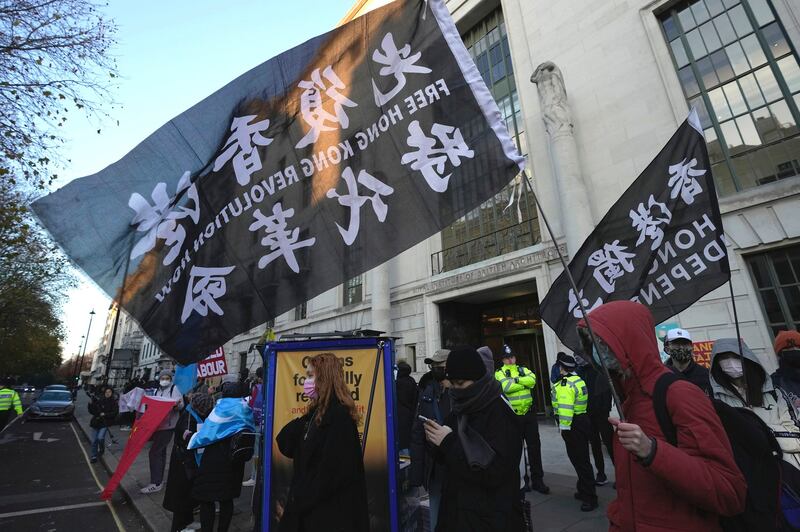Chinese spies have used LinkedIn to infiltrate targets in the United Kingdom, according to a media report, prompting calls for Foreign Secretary James Cleverly to cancel a reportedly planned trip to China.
The Times newspaper reported this week that a Chinese agent using several aliases including "Robin Zhang" has been offering cash and contracts to British government employees via the professional social media network LinkedIn.
Former ruling Conservative Party leader Ian Duncan Smith commented via his account on X, formerly Twitter: "How can the UK Secretary of State for Foreign, Commonwealth & Development Affairs @FCDOGovUK continue to think he has to go to China to 'KowTow' to China while they steal our secrets and commit genocide?" he wrote above a link to the report.
"Our policy towards China is like a front door mat…" he added.
The fresh spying allegations come amid growing concerns over Chinese Communist Party infiltration of all aspects of British life, and warnings from Hong Kongers in exile over growing acts of violence by Beijing supporters and officials alike.
The five-year spying operation tried to get thousands of officials to hand over state secrets in exchange for large sums of money and lucrative business deals, The Times reported.
"The intelligence officer for Beijing’s main spy agency created a string of aliases and fake companies to target security officials, civil servants, scientists and academics with access to classified information or commercially sensitive technology," it said.
Reuters quoted three people familiar with the matter on Aug. 21 as saying that Cleverly will travel to China next week to "stabilize" ties.

‘Seeking to undermine’
But Alicia Kearns, who is current chair of the Foreign Affairs Select Committee, said China is clearly actively seeking to undermine countries like Britain.
"China is engaging in an aggressive foreign policy where it is actively seeking to undermine states like ours," she told Times Radio.
"Because if we are reliant on them, or if they infiltrate our state, we are less able to mitigate or limit the worst excesses of their behaviors," she said. "We have been leaving ourselves open to them."
The Times cited security services as saying that the operation was conducted "on an industrial scale," and is "the most prolific ... in a generation."
"Zhang contacted officials working in sensitive areas, such as the military, science and technology and politics, to try to build relationships," the report said.
"He offered a recruitment consultant £8,000 for every time they handed over details of a candidate from the intelligence services, and offered a former military intelligence official large sums of cash for information on Britain’s counterterrorism work," it said, adding that the operation appears to be the work of a single operative who can't be named due to threats to Western spies.
It named some of Zhang's account names as Eric Chen Yixi, Robin Cao, Lincoln Lam, John Lee and Eric Kim.

Zhang started out targeting defense contractors, civil servants and sensitive businesses, then switched to think tanks and academics, the report said.
The Times also reported separately that the Foreign and Commonwealth Office has banned government officials from referring to Russia, China or other countries as "hostile states" in official documents, even internally, as part of a bid to improve bilateral ties.
Fearing backlash
Meanwhile, a recent survey showed Hong Kongers are staying away from protests on British soil, for fear of a pro-China backlash.
The Initiative SAFE survey of more than 400 Hong Kongers between April and May found that only 42% trust the British police to protect them from violent attacks and harassment by supporters of the Chinese Communist Party, while 7% said they didn't trust them at all and would avoid contacting them.
And while 80% said they had taken part in community activities, only 44% said they had attended rallies or demonstrations.
"Even though Hong Kong people have settled in the U.K., they're still very hesitant about expressing their opinions or demonstrating for their beliefs in their new homeland," survey leader Julian Chan said.
Of those surveyed, 87% said they would check the background of event organizers before going, while 46% said they would stay away from rallies or protests, and 47% said they wouldn't dare to express their opinions on Hong Kong issues online.
"[These safety concerns] have led to a very unsatisfactory outcome," Chan said.
The advocacy group Hongkongers in Britain, which sponsored the survey, called on law enforcement agencies to pay closer attention to video clips of suspicious behavior at rallies and protests, and to encourage participants to report it to police.
It also called on local councils to step up publicity to inform Hong Kongers that physical attacks and verbal harassment against them are considered hate crimes in Britain.
The group also called on the U.K. government to waive criminal background checks for applicants to the BNO visa scheme, because it puts Hong Kongers trying to emigrate to the U.K. at the mercy of officials back home.
"We will make these suggestions and report the data we collected, but the final outcome depends on whether officials relax restrictions," spokesman Jason Chow said.
Translated by Luisetta Mudie. Edited by Malcolm Foster.
